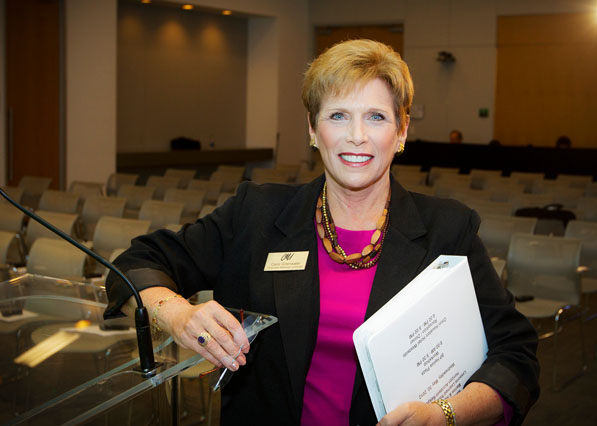Marie Campbell attributes the inspiration for her successful, $7 million environmental consulting firm to her celebration of the first Earth Day as a Girl Scout in 1970, collecting litter and earning an environmental badge at Fullerton Beach in California. Now, as founder and president of the green consulting firm, Sapphos Environmental, Inc., Campbell has not only continued that childhood tradition, but has built it into a thriving business. Sapphos is currently celebrating its 20th anniversary, its third consecutive year of recognition as a Climate Action Leader, and the perks of its revamped headquarters. Profile sat down with Campbell to discuss the key elements behind Sapphos’s success, many of which center around a different kind of green focus.
1. Be Willing to Take Risks
“As a small business owner, buying our building was a huge entrepreneurial risk, probably the riskiest thing I’ve ever done in my life,” says Campbell. The risk was further compounded when the recession hit—immediately after Sapphos’s 2007 purchase of a 1956 concrete tilt-up building to serve as the firm’s headquarters. Sapphos invested more than $1 million retrofitting the building with energy- and water-conservation technology commensurate with national green-building standards. The firm recently installed an 84 kW solar-panel power system on its roof and carports. In the five years of occupancy, the initial gamble has clearly paid off. “Now, having made this investment, the building is in a league of its own,” she says. “It’s a beautiful, green building—it’s aesthetically very pleasing, and its utility bill is $11,000 lower per month.”
2. Work Smarter
While many consulting firms have struggled through a down economy, Sapphos has seen profits rise $2 million over two years, from 2009 to 2011. Campbell attributes the firm’s success to hard work and innovative thinking. “Our municipal clients were suffering an economic crisis and asking us to provide more product for them at a lower cost,” she says. “We went to our vendors and said, ‘This is the reality of the situation we’re in. We’re not asking you to lose money, but we all have to work smarter.’ Our vendors worked with us to make that happen, achieving a 20 percent reduction in operating costs. We got leaner and meaner.” By cutting overhead and collaborating with vendors, Sapphos added value for its clients and continued to see growth.
3. Lead by Example
“As an environmental firm, it is crucial to walk the talk,” Campbell says. The firm’s mantra of leading by example has increased its market visibility and strengthened its relationships with clients. For instance, Sapphos’s recent net-zero project—the firm’s headquarters was retrofitted with energy-conserving devices and more than 500 solar panels—eliminated the company’s electricity bills. It also earned Sapphos its third consecutive year as a Climate Action Leader, and resulted in
Minority Business Development Agency recognition as the Green Environmental Firm of the Year, an award presented by Antonio Villaraigosa, mayor of Los Angeles, in March 2012. “Getting this award says that we’re really trying to do all the right things, in addition to exemplary technical work and client service,” Campbell says. “We’re not just saying, ‘Go out and be green!’ We’re leading by example and demonstrating that utilizing green technology is cost-effective.”
Much of Sapphos’s work reflects the business world’s changing attitude toward environmentalism. “The second coming of the green movement is not just about doing environmental work because it’s the right thing to do,” Campbell says. “If you use your resources wisely, you should be able to operate more efficiently.” Although there’s still a moral imperative, Campbell sees this change as part of the maturation of the movement. “It’s not enough just to do the right thing: it also has to make sense from a business standpoint,” she says.
4. Follow Your Passion
From her childhood environmentalism to her work at the US Army Corps of Engineers, Campbell has always been dedicated to the green movement. Founding Sapphos was no exception. “I leaped into it, but I’m passionate about what I do,” she says. “If you want to start a business, make sure you have a passion for your work.” Although the current economic climate has presented challenges, Campbell says that her enthusiasm for her work gives her the extra drive she needs: “I have lived the American dream in so many ways.”

